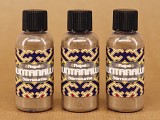Bottle, 25 Ml, 15 Gr from Brazil (SKU 3800)
(Batch #3618) Pedro Kuntanawa made this particular Rapé. Made with a locally produced and harvested organic Moy Tabaco (Nicotiana rustica) and the ashes of Pau Pereira (Tsunu) and a herb locally named Trevo Cumaru. Trevo Cumaru is Pedro´s personal favourite. He uses this herb that helps to firm the mind, clear negative thoughts and bring inner peace in the spiritual domain. This Rapé helps in concentrating the mind and firming the thoughts. More information can be found below.
Packed in 25 ml clear plastic bottles containing 15 gr.
A new and genuine tribal Rapé from the Kuntanawa tradition.
Kuntanawa means People of the Coconut, because they are known to traditionally eat mainly palm nuts. Their chief, Pedro Kuntanawa, made this particular Rapé. Made with a locally produced and harvested organic Moy Tabaco (Nicotiana Rustica) and the ashes of Pau Pereira (Tsunu) and a herb locally named Trevo Cumaru.
Trevo Cumaru is Pedro's personal favorite. He uses this herb that helps to firm the mind, clear negative thoughts and bring inner peace in the spiritual domain. It is a herb he has studied extensively in his Rapé work and has meditated on it when in ceremony. He uses this Rapé in daily life but especially rates it in spiritual works such as Ayahuasca. He says that in ceremony this Rapé helps him a lot in concentrating his mind and firming his thoughts to be able to do his healing work and his studying of the mysteries of the forest.
This is another genuine tribal, and exquisitely powerful Rapé from our close friend who lives in Brazil and is exchanging with the tribes people. Pedro is a good friend of ours and we work with him for many years.
This is an extremely fine and dry powder. It takes great effort to produce such a fine powder at a 150 micron fineness. This is our standard because this provides the best Rapé experience. All our products are processed to a high standard and consistent fineness and dryness, using laboratory grade sieves and dehydrating equipment, before packaging.
Like the Nukini, the Kuntanawa tribe became almost extinct due to the massacres of the latex cycle. One single family was left after the rubber boom and only since the beginning in 2000 a small group of Kuntanawa started to claim their indigenous heritage (Pantoja et al. 2014; Labate et al. 2014). Unfortunately, their culture is still under threat and the Kuntanawa are still struggling to regain full ethnic recognition and they are trying to regain their territory. Nowadays, there are only about 250 members left that are scattered throughout the region of Acre, Brazil. In order to survive, the Kuntanawa are joining other Pano linguistic tribes and they are organizing festivals together to share their traditions, their rituals, and their culture with foreign visitors. This small Pano linguistic tribe strongly values the ritualistic use of Ayahuasca to teach them and to guide them. The Kuntanwa even hold a strong believe that Ayahuasca will unravel their ancient knowledge and bring back their partly lost traditions (Pantoja et al. 2014). However, their language seems to be irrecoverably lost (Labate et al. 2014).
This item is not allowed in the following countries:
Finland
This natural product is offered for its ethnographic and historical value and is delivered with no expressed or implied fitness for a specific purpose. It is simply a raw botanical specimen, or a scientific sample. The information provided is purely meant for historical, scientific and educational purposes and should never be interpreted as a recommendation for a specific use. The use and application of our product is at the customer's decision, responsibility and risk.
Read our Terms & Conditions for more details.









